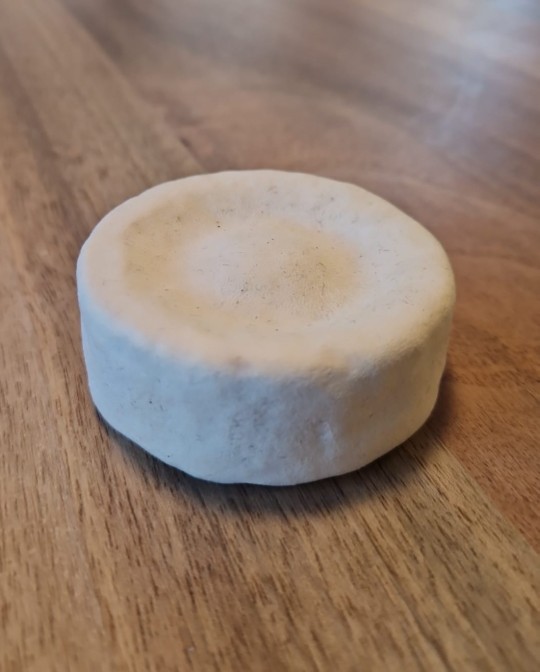#biobasement
Text
Are you searching for a reliable Oligo Synthesis Service Provider in Canada? Look no further than Bio Basic.
For over 15 groundbreaking years, we have been pioneering the synthesis of oligonucleotides for cutting-edge research. Our state-of-the-art facilities specialize in large-volume custom production, guaranteeing unwavering quality through automation. But that's not all! From Linkers to Fluorophores, Spacers to Quenchers, we offer an array of modifications tailored to your needs.
Download our order form today to request a quotation or place an order!
For more details : https://www.biobasic.com/oligo-synthesis/
3 notes
·
View notes
Text
Die Mycrobez AG entwickelt innovative Naturschaumstoffe für eine kreislaufwirtschaftliche Zukunft. In einem Workshop in Basel konnten wir mehr über den Prozess von myzelbasierten Produkten erfahren.
Als Rohstoff für die Mischung mit dem Pilzsubstrat eignen sich Stroh, Hanf oder auch Holzschnitzel, welche in der Holzwertschöpfungskette als Nebenprodukte anfallen. Wie der Ablauf von der Sterilisierung, über das Wachstum bis zur Trocknung vonstatten geht, erklärte uns Felix bei der Führung durchs Labor.
Im Workshop wurden verschiedene Möglichkeiten diskutiert, wie das Myzelkomposite in die Sandwichpaneele eingearbeitet werden kann.
Grosses Potential zur Anwendung dieser Myzelkomposite sehen sie in der Verpackungsindustrie, dem Interieur Design oder auch allgemein in der Bauwirtschaft.

#timceliumxe417#planung#kreislauffähig#wood#wissen#ressourceneffizient#wärmedämmend#nature#projekt#mycelium#biobased#nachhaltigkeit#holzwerkstoffe#möbelindustrie#mycrobez#verpackungsindustrie#interior design#sandwichpanel
1 note
·
View note
Text
High Speed Refrigerated Centrifuge

A high-speed refrigerated centrifuge is a laboratory instrument used for separating particles from a solution according to their size, shape, density, viscosity, and molecular weight. The "high-speed" aspect refers to the ability of the centrifuge to rotate at very high speeds, often measured in revolutions per minute (RPM) or relative centrifugal force (RCF), to achieve efficient separation. The "refrigerated" feature means that the centrifuge is equipped with a cooling system to maintain low temperatures during operation, which is particularly useful for preserving the integrity of sensitive biological samples.
#refrigerated micro centrifuge#biobase refrigerated centrifuge#high speed refrigerated centrifuge price
0 notes
Text
Introducing our High Speed Refrigerated Centrifuge, an indispensable tool for laboratories requiring precise separation of substances at rapid speeds while maintaining temperature control. Engineered with cutting-edge technology, this centrifuge combines high-performance capabilities with advanced refrigeration features to meet the most demanding scientific needs.

0 notes
Text
USDA: Biobased products contributed $489 billion to the U.S. economy in 2021, up from $464 billion in 2020
Tom Vilsack, US Agriculture Secretary
The U.S. Department of Agriculture (USDA) honored last 8 March the second annual National Biobased Products Day, a celebration to raise public awareness of biobased products, their benefits and their contributions to the U.S. economy and rural communities. “Bioproducts offer opportunities for more revenue streams for small and mid-sized farmers while giving…

View On WordPress
0 notes
Text
Cornstarch PSM Eco-friendly -food-trays Lunch Lunch Tray WFT-07

If you're looking for durable and eco-friendly trays, we offers cornstarch trays that is suitable for. As the one of the leading wholesale provider of food packaging solutions, we offer cornstarch trays with various shape and size. We regularly partner with different types of foodservice facilities, including:
Quick Service Restaurants
Supermarkets
Retail Stores
And more!
0 notes
Text
𝗩𝗼𝗼𝗿𝗮𝗮𝗻𝗸𝗼𝗻𝗱𝗶𝗴𝗶𝗻𝗴 𝗮𝗮𝗻𝗯𝗲𝘀𝘁𝗲𝗱𝗶𝗻𝗴 𝗿𝗲𝗮𝗹𝗶𝘀𝗮𝘁𝗶𝗲 𝗱𝘂𝘂𝗿𝘇𝗮𝗺𝗲 𝗲𝗻 𝗰𝗶𝗿𝗰𝘂𝗹𝗮𝗶𝗿𝗲 𝗻𝗶𝗲𝘂𝘄𝗯𝗼𝘂𝘄 𝗚𝗲𝗺𝗲𝗲𝗻𝘁𝗲𝗵𝘂𝗶𝘀 𝗞𝗿𝗶𝗺𝗽𝗲𝗻𝗲𝗿𝘄𝗮𝗮𝗿𝗱 👈
HEVO verzorgt het projectmanagement voor de nieuwbouw van het duurzame, circulaire gemeentehuis van de Gemeente Krimpenerwaard. Het definitief ontwerp is inmiddels gereed en vastgesteld.
Binnenkort start selectiefase van de Europese, niet-openbare procedure voor de aanbesteding van de uitvoerende partijen. De verwachte publicatie op Tenderned is rond 3 november a.s.
De aanbesteding zal twee percelen kennen: 1. Bouwkundige werken inclusief coördinatie over de andere uitvoerende partijen en 2. Installatietechnische werken (E en W). Voor meer informatie verwijzen wij graag naar de aankondiging op de website van de gemeente Krimpenerwaard: https://www.krimpenerwaard.nl/gemeentehuis-aanbesteding of naar Michiel Otto.
HEVO: https://www.hevo.nl/actueel/nieuws/gemeentehuis-krimpenerwaard-energieneutraal-en-circulair.

#projectmanagement#school#nieuwbouw#huisvesting#aanbesteding#circulair#gemeentehuis#duurzaam#biobased
0 notes
Link
#bio-circular#biobased#Bridgestone#circularfeedstock#ContiCityPlus#ContinentalTires#efficienttires#Futurride#Goodyear#IAAMobility#InternationalSustainabilityandCarbonCertification#ISCC#ISCCPLUS#Michelin#Munich#recycled#renewable#sustainablematerials#sustainablemobility#sustainabletires#tireefficiency#tiresustainability#UltraContactNXT
0 notes
Text
GARMENT- As soon as we hear this word the only element that comes to mind is the FABRIC, as the quality of the garment ultimately depends on the fabric it is made with. Everyone needs the best quality fabric at the most competitive prices and therefore, we at ARTEX OVERSEAS aim to provide you with an exquisite range of sportswear fabrics
0 notes
Text

Sustainable adhesion: Ceresana investigates the world market for biobased adhesives
Adhesives make many environmentally friendly products possible: lightweight car bodies and batteries for electromobility, insulation glazing for facades and insulating panels as well as corrugated cardboard packaging or simple paper bags. Increasingly, however, not only the end products but also the adhesives themselves are to be "organic" – in fact, more than 13 million tonnes are already produced around the world each year, and this figure is rising. So far, conventional petrochemical plastic products have accounted for the largest share. However, Ceresana's latest market report predicts that adhesives made, at least in part, from renewable raw materials will grow significantly and global revenues will reach around USD 3.8 billion by 2032.
Further information about the new market study “Biobased Adhesives”: https://ceresana.com/en/produkt/biobased-adhesives-market-report
0 notes
Text

Welcome to Bio Basic!
Your ultimate destination to explore top-notch Gene Subcloning-Vector Insertion services.🔬🧬
Our experienced team has years of expertise in this field and is well-equipped with top-notch facilities for flawless gene cloning and vector insertion🧪💻. Whether it's your gene in a specific vector or crafting DNA fragments, we've got the solutions!✨
Enjoy competitive prices and a faster turnaround🚀. So, no more delays in your research progress!
Why wait? Simply browse https://www.biobasic.com/gene-subcloning/ and just click the Gene Order Portal now!🖱️👩🔬
#biobasic#subcloning#insertion#vectorinsertion#cloning#research#prices#fragments#wellequipped#solutions
0 notes
Text
Wissen
Ist Pilz der Kunststoff der Zukunft?
Matt Ferrell erklärt im Video, wie Plastik die Herstellung von Produkten für immer verändert hat, mit negativen Folgen für die Umwelt. Die Myzeltechnologie könnte die Lösung und der nächste grosse Boom sein… ein kunststoffähnlicher Ersatz mit so vielen Verwendungsmöglichkeiten und neuen Chancen für Produkte und Unternehmen.
youtube
#timceliumxe417#Youtube#kreislauffähig#wood#wissen#ressourceneffizient#kunststoff#wärmedämmend#nature#projekt#mycelium#sandwichpanel#biobased#nachhaltigkeit#holzwerkstoffe#pilzmyzel#verpackung#plastic
0 notes
Text
Biological Safety Cabinet Class

Biological Safety Cabinets (BSCs) are essential pieces of equipment used in laboratories, particularly those handling hazardous materials. BSCs are classified into different classes based on their design and level of protection they provide to both the operator and the environment. The primary classification system used for BSCs is defined by the NSF/ANSI 49 standard. Improved with a simple control panel includes a soft touch key that operates at maximum airflow velocity > 0.3 m/s.
0 notes
Text
Chemical industry will soon replace Shell, Exxon and BP by farmers and foresters

Within the next twenty years, the role of oil companies such as Shell, Exxon and BP in the chemical industry may have been played out. Plastic will then no longer be made from oil, but from sugar beet, grains, corn, wood and recycled plastic. Supplied by farmers, foresters and recyclers. The National Growth Fund has made 338 million euros available for this BioBased Circular project.
The application was submitted by the Top Sector Agri & Food[1] and the Green Chemistry, New Economy (GCNE)[2] platform. They are supported in this by more than 125 companies and social organizations, including knowledge institutes such as the universities of Wageningen (WUR) and Groningen (RUG) and TNO[3]. The total project will cost 850 million euros until 2032. In addition to the subsidy from the growth fund, the participating companies themselves invest another 550 million euros in the project.
European leader
The aim of the project is to turn the Dutch chemistry into a leader in making plastics and plastics from building blocks found in nature.[4] The thought behind it is simple. The most important raw materials for plastic in packaging, construction, textiles and paint are carbon compounds. The chemistry now extracts this from petroleum, in fact millions of years old remains of plants and animals that are pumped up from the soil. You can now also get those carbon compounds from the carbohydrates of plants. They capture CO2 from the air and convert it into carbon compounds. “We use the power of plants,” says chairman Arnold Stokking of the Green Chemistry, New Economy platform. “The use of oil will take some time, but we have to start this transition now. The sense of urgency is important.”
Linking chemistry to farmers and foresters
The aim of BioBased Circular[5] is to set up new production chains between the chemical industry and suppliers of biobased raw materials. The technology to make so-called biopolymers and other plastic building blocks from plants already exists, but needs to be scaled up. In the Netherlands, leading European companies such as Avantium[6] and Cosun[7] and promising scale-ups such as Paques Biomaterials[8], Relement[9] and Plantics[10] are already working on this.[11] “The Growth Fund provides a lot of subsidy for R&D. That's part of it for us, but our companies are already really working on this and it's mainly about scaling up," says Stokking.
The plant material can come from various sources, varying from residual flows from agriculture, landscape management and the agri-food sector, from pruned wood from forestry or from crops specially grown for this purpose, such as grains and corn. Land that is still unused can also be used for cultivation in the future. The project cites as examples biobased polyester from sugar beet, biobased resins for the construction and furniture industry, biobased paints, coatings and insulation materials from vegetable residual flows and degradable biopolymers from waste water. The aim is to link companies from these different sectors as suppliers and customers.
A third less CO2 emissions
Plastic granules or pyrolysis oil for new plastic can also be made from recycled plastic. That is why recycling companies such as Renewi[12] have joined. The new plastics must be made in such a way that they are easier to recycle. Then they do not have to be thrown away or incinerated, but can be used again and again as raw materials in a circular economy. Then the CO2 from the biobased raw materials is long-term stored in the material, just like in wood. If successful, the chemical industry could reduce its emissions by 3.5 to 5.8 million tonnes per year. That is a third of current emissions. This transition can also create 2,500 to 8,300 new jobs and allow the Dutch economy to grow by 1.5 to 3.5 billion annually.
From nursery to flagship
The start-ups and scale-ups that have been supported by GCNE and other knowledge institutions in recent years can be scaled up by the subsidy. “We are now moving from idea phase to implementation, from nursery to flagship,” says Stokking. The intention is to build a large flagship installation somewhere in the Netherlands, where five so-called demonstrators – the companies that are already working on these technologies – annually produce 100 kilotons of bioplastics from plant-based materials. The subsidy from the Growth Fund is divided into two phases. Until 2026, BioBased Circular will receive 102 million euros. If after evaluation it appears that the project is on the right track, it will receive another 236 million until 2032. Stokking: “But with that 100 million we can go ahead for the first three years.”
Source
André Oerlemans, Chemie vervangt straks Shell, Exxon en BP door boeren en bosbouwers, in: Change Inc, 3-7-2023, https://www.change.inc/industrie/chemie-vervangt-straks-shell-exxon-en-bp-door-boeren-en-bosbouwers-40148
[1] The world faces enormous challenges. In the next generation, the world's population will increase by 2 billion people. In addition, 800 million people today suffer from chronic hunger or lack of proper nutrition. So we need to produce more food than ever before. At the same time, different trends call for different foods. Due to increasing prosperity worldwide, the demand for high-quality proteins such as vegetables, dairy and meat is increasing. A growing proportion of the population has to contend with diet-related health problems (obesity, diabetes) and consumers are increasingly consciously opting for healthier and more sustainable food. Although the Dutch agricultural sector has the lowest global impact per kilogram of food on the environment, climate and biodiversity, further improvement is necessary and possible. That is why extra attention is needed for the development of climate-neutral, resilient and robust production systems, in which circularity and the reuse of residual and secondary flows are also important. Animal welfare is also an important topic. https://topsectoragrifood.nl/over/
[2] The Green chemistry, new economy platform aims to accelerate the sustainable transition in manufacturing chemistry. A green chemistry, in which innovative technologies and business models with game changers are given the opportunity to realize a new economy based on non-fossil raw materials. The platform wants to contribute to improving the innovation and entrepreneurial climate in collaboration with the clusters in the regions. New connections are essential to realize a circular and sustainable economy.https://groenechemie.nl/
[3] TNO is a Dutch independent research organization composed of units, councils and a services organisation. Meet our Supervisory Board, Executive Board and Council for Defense Research. https://www.tno.nl/nl/over-tno/
[4] Read also: https://www.tumblr.com/earaercircular/680593919260622849/west-brabant-becomes-hotspot-for-chemical?source=share
[5] https://topsectoragrifood.nl/biobased-circular/
[6] The listed Dutch company Avantium develops biobased plastics and chemicals. The company was founded in 2000 as a spin-off from Shell. Today Avantium consists of three business units: Renewable Chemistries, Catalysis and Renewable Polymers. The head office is in Amsterdam and the company will have 230 employees as of 2020. The current CEO is Tom van Aken. https://www.change.inc/bedrijven/avantium
[7] Royal Cosun is a cooperative that converts the potential of plants into usable solutions, such as plant-based foods and ingredients for humans and animals, biobased non-food applications and sustainable energy. The business groups Aviko, Cosun Beet Company, Duynie Group, Sensus and SVZ are part of Cosun. In 2021, around 4,000 employees will be working on the development and production of plant-based solutions, which will jointly generate an annual turnover of approximately 2.3 billion euros. https://www.change.inc/bedrijven/royal-cosun
[8] Bacteria in waste water that naturally produce bioplastic, which is completely broken down in nature by the same bacteria after use. The Frisian company Paques Biomaterials wants to use it to conquer the market for alternatives to fossil plastic. https://www.change.inc/industrie/paques-biomaterials-maakt-echt-afbreekbaar-bioplastic-uit-afvalwater-39486
[9] Relement is one of the start-ups with the potential to drastically change the chemical industry. It offers a more effective biobased alternative to an important fossil ingredient in paint, among other things. It concerns the ingredient that makes paint scratch-resistant by giving it a certain hardness: an aromatic. To make that ingredient, the start-up uses a renewable biobased raw material called furfural instead of fossil petroleum. https://www.change.inc/industrie/mijn-fundamentele-geloof-is-dat-de-chemische-industrie-niet-zelf-kan-veranderen-39231
[10] Plantics is a spin-off of the University of Amsterdam (UvA). During a 'Friday afternoon experiment', biofuel experts Albert Alberts and Gadi Rothenberg, from the Sustainable Chemistry research group, discovered a method for making biodegradable resins, thermosetting plastics, from plant material. https://www.change.inc/industrie/amsterdamse-start-up-maakt-eerste-concurrerende-bioplastic-9871
[11] Read also: https://www.tumblr.com/earaercircular/710350099144949760/these-green-start-ups-indicate-the-way-to-a?source=share
[12] Waste-to-product organization Renewi collects waste, processes it and turns it into new raw materials. Of the 14 million tons of waste the company processes annually, 65 percent is recycled or used for energy recovery through incineration. The company was created in 2017 after a merger of Shanks Group with the Van Gansewinkel Group. Renewi is listed on the London Stock Exchange and Euronext Amsterdam. The head office is in the United Kingdom. https://www.change.inc/bedrijven/renewi
0 notes
Text
0 notes